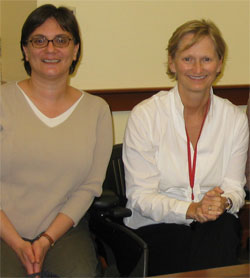What kind of country do we want to be?
Hiding in plain sight behind the pageantry of this summer's political conventions is the specter of the third anniversary of Hurricane Katrina, which hit New Orleans on Aug. 29, 2005.
In the midst of the foreclosure crisis and rising unemployment, we should pause and remember that we have not yet learned the lessons of Katrina or confronted the effects of concentrated poverty in our cities.
To mark Katrina and move forward, we must spend more time -- in schools, communities, libraries and churches -- evaluating who we are as a society and nation. We must ask ourselves and our neighbors: What kind of country are we? What kind of country do we want to be? The poverty in New Orleans that set the stage for disaster, the inept governmental response to that tragedy and our current economic crisis all raise the question: What we can expect from our government in times of acute need? More bluntly, what good is a government that cannot prevent man-made disasters or help us plan for the inevitable natural ones?
The social and political conditions that made Katrina a disaster have barely surfaced in this year's political debate. The possibility that ever-stronger hurricanes or other disasters will hit cities with their own fair share of the poor -- such as New York, Washington, D.C., and Miami -- suggests the importance of finding a national solution to these problems.
Earlier this year, the homeless rate in post-Katrina New Orleans reached one in 25, the highest ever recorded for an American city. While there have been many success stories in rebuilding the Gulf Coast over the past three years, according to the most recent ''Katrina Index,'' reported monthly by the Brookings Institution and Greater New Orleans Community Data Center, rents in New Orleans are up by 46 percent since Katrina, making it almost impossible for workers in many service industries to return to the city. According to the same report, only 19 percent of the public buses that operated pre-Katrina are now running. The city's public health and mental health systems, already strained before Katrina hit, cannot provide adequate services for the city's residents.
The preparation of a knowledgeable citizenry that can deal with such problems has been a primary mission of public schools since their inception, and civic education, a required subject in most states for decades. Yet many teachers report that civic education is on the wane, squeezed out by pressures related to high stakes tests in reading and math. Katrina reminds us of the ongoing need for civic education and public engagement with the problems we face as a country, especially as our political culture remains distracted by mudslinging.
A July 16 Time magazine report suggests that Americans want government solutions to these problems. Respondents to a Time/Rockefeller Foundation poll ``support major government investments that create jobs -- 82 percent favor public works projects -- and they remain sympathetic to the economy's victims: 70 percent say more government programs should help those now struggling.''
But government solutions without political participation won't work. The third anniversary of Hurricane Katrina should serve as a reminder that we need to re-affirm our commitment to high-quality civic education and communal dialogue about critical social issues.
As we elect a new president, let's not be distracted by the high price of gasoline or the need to raise standardized test scores from the fundamental problem of inequity in our society, not just in New Orleans. What kind of country are we? What kind of country do we want to be? Three years after Katrina, we have yet to ask, much less answer, these important questions as a nation.
Published Tuesday, Sep. 2, 2008
